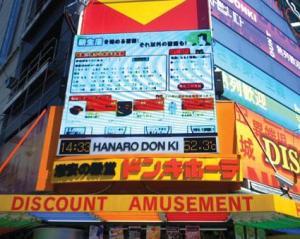Market Data & Retail Focus

Measure For Measure
Hard information about selected industries, a corporate profile of a major Japanese listed company, and a column on a selected player from the retail industry
Finance
- Value of false share purchase disclosures made at the Financial Services Agency’s EDINET website attributed to Teramento in January: ¥20 trillion
- Capitalization of Teramento: ¥1,000
- Number of Liberal Democratic Party lawmakers who put their name on a proposal to extend temporary tax breaks on capital gains and dividend income taxes in January: 58
- Figure that the Nikkei index would have to hit in order for the proposed extension of tax breaks to be revoked: 18,000
- Estimated decline in paper value of equity holdings at Japan’s six major banks from June 2007 to January 2008: 70%
- Approximate percentage of orders executed on the Tokyo Stock Exchange by foreign traders: 60%
- Decline in share price of Mizuho Financial Group from April 2006 to January 2008: 51.65%
- Mizuho Financial’s dividend per share in 2007: ¥7,000
- Japan’s estimated nominal GDP in fiscal 2007: ¥516 trillion
- Estimated nominal GDP for 2011: ¥574 trillion
Real Estate
- Decline in the supply of new condominium units for sale in the Tokyo area in 2007 compared to 2006: 30%
- Rise in price of the average new condominium unit for sale in the Tokyo area in 2007 compared to 2006: 10.6%
- Average cost for a new condo in the Tokyo area in 2007: ¥46.44 million
- Projected decline in the supply of new condominium units in the Tokyo area for 2008: 1.6%
- Projected decline for the Osaka area: 7.3%
- Amount that real estate investment advisor DaVinci is planning to sink into a new fund investing in property developers in 2008: ¥200 billion
- Increase in average Tokyo office rents in the five central wards of Tokyo (Minato, Chuo, Chiyoda, Shibuya and Shinjuku) in 2007 compared to 2006: 13.36%
- Average increase in office rent at newly built buildings in the five central wards of Tokyo in 2007 versus 2006: 25.64%
- Average rent per square meter at office buildings in the five central wards of Tokyo in January 2008: ¥6,666
- Average rent per square meter at newly built office buildings in the five central wards of Tokyo in January 2008: ¥10,881
Consumer Electronics
- Estimated total sales from gaming hardware and software in Japan in 2007: ¥687.76 billion
- Percentage increase from previous year: 10%
- Percentage of Nintendo shares owned by non-Japanese at the end of 2007: 46.3%
- Number of Wii Fit software units sold as of January 6, 2008: 1,000,000
- Number of Wii units sold in China in 2007: 0
- Nintendo’s forecasted earnings for the year ending March 31, 2008: ¥460 billion
- Percentage by which that exceeds Nintendo’s earnings in the previous year: 100%
- Sony’s earnings increase in the first nine months of fiscal 2007: 75%
- Percentage of Sony’s electronics sales that come from the US: 25%
- Sony’s rise in game console sales for the October-December quarter: 31.2%
- Percentage by which Sony cut its prices for the PlayStation 3 console in the US and Japan, respectively: 17% and 10%
- Increase in plasma TV sales at Matsushita in the October- December quarter: 10%
Sources:
Japan Real Estate Institute, Haseko Research Institute, Nihon Keizai Shimbun, Miki Shoji, Japan Economy News, Financial Services Agency, Tokyo Stock Exchange, Enterbrain, Council on Economic and Fiscal Policy, Matsushita, International Monetary Fund.
Compiled by Ken Worsley of www.JapanEconomyNews.com
 Don Quijote, a chain of one-stop discount shops.
Don Quijote, a chain of one-stop discount shops.
Retail Focus:
Don Quijote
By Sarah Noorbakhsh
In the shopping paradise that is Japan, the retail business can often be dog-eat-dog, with companies racking their best brains for ideas on how to please the country’s notoriously fussy customers. For these discerning consumers, not just the price, but the whole of a shopping experience, can make or break a store’s success.
Enter Don Quijote, a chain of one-stop discount shops that offers more than just no-frills low prices, established in Tokyo in 1980. The company listed on the second section of the Tokyo stock exchange in 1998 followed by a listing in the first section in 2000. Eight years later, the company has annual net profits totaling over ¥10.6 billion and almost 150 stores around the country selling everything, from sex toys to Chanel handbags, 24 hours a day.
What gives Don Quijote its appeal? Although ostensibly cheap, savvy comparison shoppers would turn up their noses at many of the items packed into shelves and display cases, heading around the corner to other shops to find better prices. And, Don Quijote also has comparatively poor customer service, with long queues and abrupt staff.
However, in exchange for these shortcomings, consumers get a shopping experience unlike any other. At first, walking amongst the jumbled products that spill out into the aisles, it is difficult to pin down exactly what makes Don Quijote different. But a quick listen to the jingle that echoes throughout the maze of narrow passageways and neon-encrusted nooks, instantly gives words to the experience: “voluminous rock-bottom price jungle.” It is this jungle-like atmosphere which marks Don Quijote’s continuing popularity.
Don Quijote is also popular with foreign residents and travelers from overseas.
Listed on Yahoo! Travel for Tokyo and having made news internationally, Don Quijote’s one-stop shopping with a twist is now a popular tourist destination. Aware of this appeal, the outlet has now started to pursue success internationally having purchased Daiei’s four Hawaii locations in 2006.
Domestically however, the chain has faced some challenges. Yokohama residents protested the building of a store there citing noise, traffic and disturbance, and the store has also been criticized in the Japanese courts for its poor structure, fire-training and accident planning after several arson attacks in 2004. Don Quijote has also faced criticism for attempting to sell drugs at its stores in response to the shortage of certified pharmacists open late at night. Health authorities blocked this initiative for violating the pharmaceutical law.
Yet, despite these niggles, Don Quijote is still going strong. The question is, in the future, will its reputation for convenience and adventure-shopping continue to balance out their not entirely discounted prices and unexceptional service? Or, will consumers retire their safari hats for a more conventional shopping experience?
Corporate Profile: Inpex Holdings Inc
- President & CEO: Naoki Kuroda
- Business: Oil, natural gas and energy exploration
- History: Established in 2006. Result of the government backed integration of Inpex Corporation and Teikoku Oil Co Ltd
- Capital: ¥30 billion
- Net Sales in 2007: ¥979,731 million
- Net income per share in 2007: ¥70,423.45
- Major projects: Development of LNG at the Ichthys gas condensate field in Australia, development of gas reserves at the Abadi gas field in Indonesia, production of crude oil in the Caspian Sea, Azerbaijan, Kazakhstan and the Minami- Nagaoka gas field in Japan.
- Interest points: The Japanese government owns a 36% controlling stake; in 2006, Inpex reduced its stake in the Azadegan oil field in Iran from 75% to 10%, probably for political reasons.
- Fourth Quarter Performance: Inpex has had a hard quarter with projected cost increases on its Ichthys development and being forced to cede some of its stake in the Kashagan field in Kazakhstan to domestic player KazMunaiGaz. In the market slump on January 22 2008, Inpex stock plummeted by 9.6% to ¥913,000.
By Peter Harris





